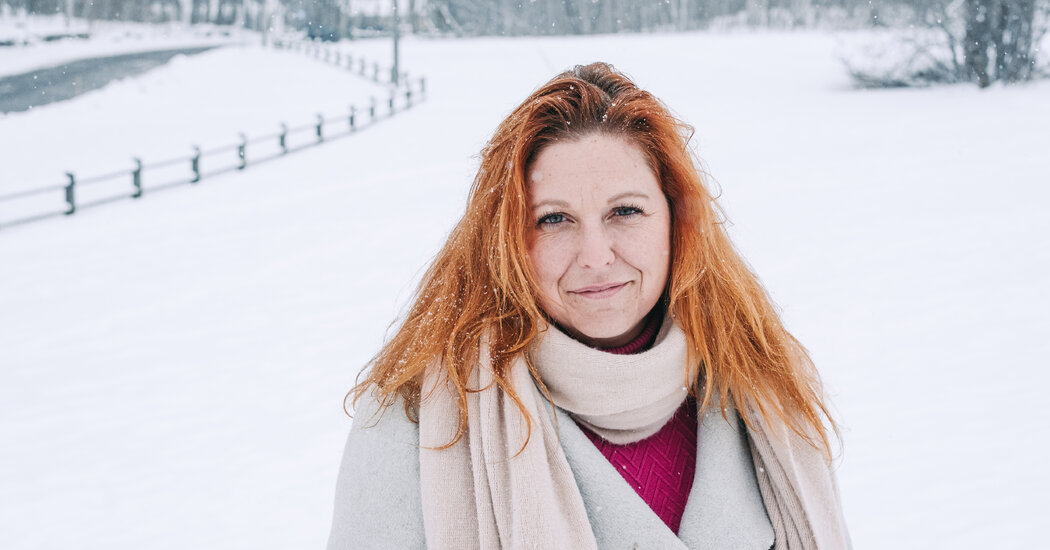One recent evening, Sandra Demontigny tried to write down when she would die.
“I sat down in a corner with a candle next to me, just to create my own bubble, to think and to cry a little,” she said.
She had reflected on this moment for years, desperately hoped for it, fought tirelessly for it. But the words refused to come out. The form before her remained blank. How, exactly, does one decide when to end one’s life?
Canada’s French-speaking province of Quebec last fall became one of the few places in the world to allow a person with a serious and incurable illness to choose medically assisted death in advance — perhaps years before the act, when the person still has the mental capacity to make such a momentous decision.
And Ms. Demontigny — a 45-year-old mother of three, diagnosed in the prime of her life with a rare form of early-onset Alzheimer’s — played a pivotal role in lobbying for the change.
Some facing such a grave health challenge might have withdrawn. But even as Ms. Demontigny (deux-mon-tee-gnee) began losing her memory, she became the face of the campaign to expand the right to die in Quebec.
In front of health ministers and lawmakers, on talk shows, in countless interviews, she spoke of how she had inherited the Alzheimer’s gene carried by her family. She recalled how her middle-aged father, in the last years of his life, became unrecognizable and aggressive. She wanted to die with dignity.
Still, four months after Quebec expanded the right to die, she had yet to fill out the advanced request forms. Choosing death was agonizing enough, but Ms. Demontigny had to declare, in precise details, the circumstances under which the lethal dose would be administered. Should it be carried out when she needs care round the clock? When she no longer recognizes her own children?
“Even though it’s a subject that’s preoccupied me for years, it’s different now because I have to make an official request,” Ms. Demontigny said. “But I’m not changing my mind — that’s for sure.”
Under the new law, an advanced request for assisted death must meet a set of criteria and be approved by two physicians or specialized nurses.
Across the world, only a few countries — including the Netherlands, Belgium, Luxembourg, Spain and Colombia — recognize advance requests for assisted deaths, though, in some cases, not for people suffering from Alzheimer’s or other forms of dementia.
At her one-bedroom apartment, Ms. Demontigny spoke during a two-hour interview often punctuated by the cries of a very voluble siamese cat named Litchi. Her partner, André Secours, was visiting — helping her recall a detail, reminding her of a scheduled phone call in the afternoon or an appointment the following day.
Though only in her mid-40s, Ms. Demontigny moved into the apartment — inside a residence for older people in Lévis, a suburb south of Quebec City — as she needed more help a year ago. She chose to live alone, not wanting to burden her family. Her two older children were already adults, and her youngest went to live with Ms. Demontigny’s former husband.
Her front door was covered with reminder notes. A timer on top of the stovetop range cuts off power automatically. The dresses in her closet were methodically arranged and archived with photos on her smartphone. No system was foolproof, though.
“I’m doing something,” she said, “and Litchi walks past by me, and I follow Litchi and I forget what I was doing.”
Bright sofa covers — brought back from Bolivia, the Democratic Republic of Congo and other places where she had worked as a midwife — hinted at her life before her Alzheimer’s diagnosis at age 39.
Ms. Demontigny decided to become a midwife after the difficult birth of her first child. The obstetrician, she said, performed a procedure without warning her.
“It’s my body — can you at least tell me?” Ms. Demontigny said.
As a midwife, she wanted women to be able to give birth in a respectful and natural environment.
For Ms. Demontigny, there was a direct link between a proper birth and a proper death.
“Life and death resemble each other,” she said.
When Ms. Demontigny learned that she had Alzheimer’s, she slipped into depression but was not surprised. Several older relatives had begun experiencing symptoms of Alzheimer’s at a young age, though they kept the illness hidden as long as they could, out of shame.
Her father started losing his memory in his mid-40s and stopped working at 47. At home, he spent his days wandering, bumping into walls and collapsing from exhaustion. In his final years at a health facility, he licked the floor and acted menacingly, even threatening to kill his son, Ms. Demontigny’s brother.
Like many Québécois families, Ms. Demontigny’s parents had drifted away from the Roman Catholic Church, and Ms. Demontigny considered herself an atheist. And yet, when her father died after years of anguish, she said she felt his soul depart.
“I hadn’t seen him like that, at peace, in at least 10 years,” she said.
While her parents’ generation kept silent about Alzheimer’s, Ms. Demontigny set up a Facebook page in 2019 to describe living with the illness. The social media posts from a mother of three, not yet 40, who had to give up her career as a midwife because of a rare form of Alzheimer’s, resonated in Quebec. She became the spokeswoman for the Federation of Quebec Alzheimer Societies and wrote a book about her experience, “The Urgency to Live.”
Quebec legalized assisted death a decade ago, before the rest of Canada. Under the law, a person had to be in an “advanced state of irreversible decline in capability” and “must expressly confirm their consent immediately” before the assisted death. But the requirements presented a problem for those suffering from an incurable and serious disease like Alzheimer’s, who were likely to lose their capacity to consent.
Dr. Georges L’Espérance, a neurosurgeon and president of the Quebec Association for the Right to Die with Dignity, said Ms. Demontigny helped press to allow for advance requests after becoming the group’s spokeswoman in 2022.
“She played a primordial role,” Dr. L’Espérance said. “It’s fine to discuss these concepts in the abstract. But it’s different when you can link an illness to someone that people can identify with. And Sandra’s an open book and very credible.”
Mr. Secours, Ms. Demontigny’s partner, said fighting for the change had helped fill the void created by her diagnosis.
“She had never expected to commit herself to a cause,” Mr. Secours said. “But that saved her, that gave meaning to her life.”
In the half-decade since her diagnosis, Ms. Demontigny had led a busy life — speaking out, writing a book, becoming a grandmother. She had embarked on a romantic relationship with Mr. Secours, 72, who lived across the street from her old place.
“André talks to everybody, says hello to everybody, he’s very cheerful,” Ms. Demontigny said.
“We were friends, neighbors, in the beginning, then our affection developed,” Mr. Secours said.
Some people, though, asked him why he had chosen to get involved with someone with an incurable illness.
“Even my mother, who just turned 100 and sees very well, told me, ‘André, you’re really not making your life easier.’”
“She doesn’t say that anymore,” Ms. Demontigny interjected.
The couple vacationed in Costa Rica last year and were hoping to go on a safari in South Africa, they said, as Litchi now lay sleeping before the television.
Perhaps it was this, the life she was still able to lead and enjoy, that made it difficult for Ms. Demontigny to put down in writing, as required by law, the “clinical manifestations” that will lead to assisted death.
Because Ms. Demontigny is likely to become incapable of consenting as her illness progresses, the manifestations she describes will “constitute the expression” of her consent in the future.
In fact, she had written in her book that she wanted assisted death to be carried out when certain conditions were met, including being unable to recognize even one of her children and behaving aggressively toward her loved ones. But though she knew exactly what she was going to say as she sat over the documents on that recent evening, she could not bring herself to write it down, not yet.
“I’m not going to change my mind because for me, in my situation, that’s the best possible end,” she said. “But I don’t want to die. I’m not ready. That’s not what I want.”


